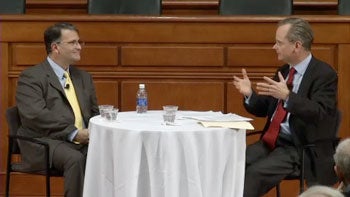Appearing at Harvard Law School a year and a half after being released from federal prison, a contrite Jack Abramoff expressed a desire to thwart the political corruption he once infamously practiced.
The event on Dec. 6 was sponsored by the Edmond J. Safra Center for Ethics, whose director, HLS Professor Lawrence Lessig, interviewed Abramoff, a former lobbyist who pleaded guilty in 2006 to charges of fraud, tax evasion, and conspiracy to bribe public officials. “His experience,” said Lessig, “has an enormous amount to teach us.”
Lessig emphasized that he didn’t intend to relitigate Abramoff’s criminal case but sought to “help all of us understand a system more that almost none of us respect.” (Abramoff writes about the problems with the system in his book, “Capitol Punishment: The Hard Truth About Washington Corruption From America’s Most Notorious Lobbyist.” Lessig also examines similar issues in his own new book, “Republic, Lost: How Money Corrupts Congress — and a Plan to Stop It.”)
According to Abramoff, he started his lobbying career intending to persuade members of Congress to vote for his side based on the merits of a bill. However, he soon realized that “merits are interesting but they don’t necessarily win.” What does win, he said, is money; although members of Congress won’t usually ask for it directly, they will often promise to support a bill — and then mention a fundraiser they’re giving.“They’re soliciting bribes, is what they’re doing,” Abramoff said. “Unfortunately, it’s spread throughout the system, whether it’s subtle or not.”
He also identified other problems, such as legislators who use congressional hearings as a “weapon” to punish opponents. In addition, he described congressional offices run by staffers whom Abramoff would promise to hire and therefore were beholden to him even as they worked in Congress. When Lessig noted that the problems Abramoff was detailing weren’t associated with his crimes, he replied: “What’s legal in the system is the problem. That’s where America’s attention ought to be focused.”
Abramoff mapped out reforms to the system in consideration of what he would have tried to stop when he was a lobbyist, he said. He proposed term limits for members of Congress, that they and their staffers should be banned from lobbying for life, and that anyone who lobbies or receives government contracts or grants should not be allowed to give political contributions.
These ideas came to him while he was walking on the track in prison, he noted. While calling his incarceration a “nightmare,” he expressed regret for the actions that led him there. Abramoff acknowledged, however, that he didn’t believe he had done anything wrong when he was initially accused of wrongdoing. And, he added, the people who continue to corrupt the political system don’t think they’re doing anything wrong either.
See additional coverage of Abramoff’s talk in Talking Points Memo’s TPM Muckraker blog.
